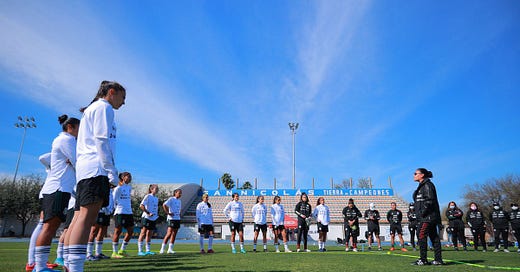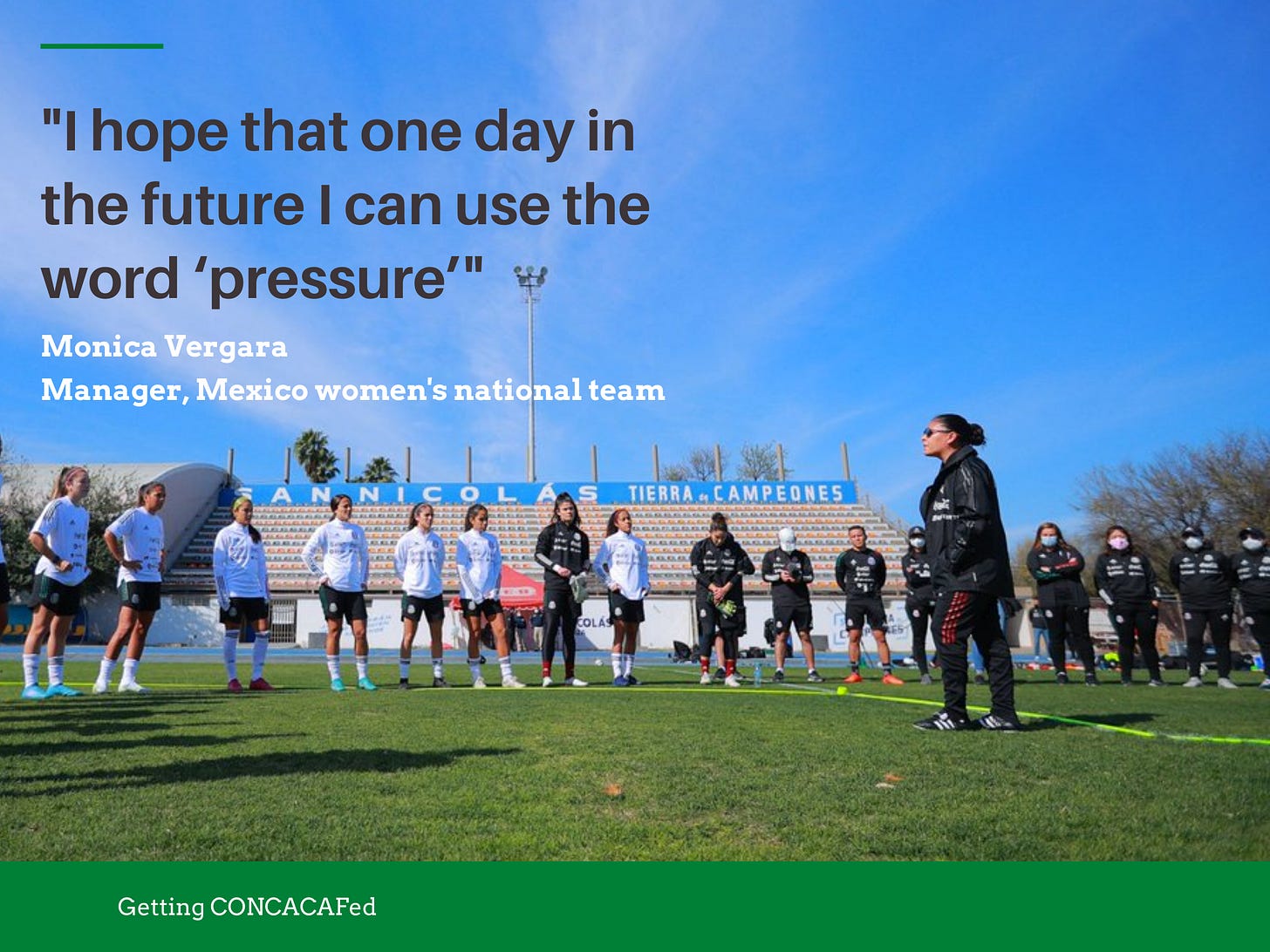🇲🇽 Monica Vergara welcomes the pressure & hopes fans fall in love with her team
Ahead of today's WCQ opener, the Mexico manager says criticism would be another sign of growth in Mexico.
Welcome to Getting CONCACAFed! If you want more coverage of soccer in the reason, subscribe below!
As a player and as a coach, Monica Vergara knows what it means to be in pressure-packed moments.
She played in the 1999 World Cup, starting a pair of group games as a 16-year-old. She managed Mexico to the final of the 2018 U-17 Women’s World Cup, falling to Spain 2-1 in the final.
Now her task is to get Mexico’s senior women’s national team back to the World Cup.
The job starts tonight with Mexico hosting Suriname. Women’s soccer is experiencing a boom in Mexico, and more eyes than ever are on the national team.
Yet, the 38-year-old told me this week she isn’t feeling the pressure yet, as she craves even more eyeballs on what the Mexican women’s squad is doing in a country that long has had its gaze fixed on every second the men’s team plays.
“I hope that one day in the future I can use the word ‘pressure’ because, we’re developing. I’m very clear on that,” she said in a Zoom call. “We’re putting a lot of demands on ourselves. Rather than saying it’s pressure, I’d say it’s the requirement for every individual who is involved to do our best to be able to take our country to the World Cup, from the directors, the coaching staffs, the support staff members who are with us, the players, and even all our fans.
“I can tell you we’re all playing our small part every day for this to be achieved, and obviously it’s a normal step of growth that you’ll be in the public eye more.”
She’s not asking for #VergaraOut to trend on Twitter, but there’s no doubt that more attention being paid to the Mexico women’s team is a good thing.
Mexico missed out on France 2019 after falling in the group stage of qualification, a shock not only because of the country’s historical success but also because the Liga MX Femenil was launched shortly before qualification.
Simply having a league, however, was never going to be enough to lead to success at the international level. With the structure of the league now modernized, Vergara is calling on far more players who currently play in or developed in and moved on from Liga MX Femenil.
The manager praised those involved with those changes and the growth of the sport as a whole, from FMF president Yon de Luisa and sporting director Gerardo Torrado to coaches at amateur clubs who are laying the foundation for domestic player development.
With Liga MX Femenil now going down to the U-17 league and more focus than ever put on homegrown Mexican players, Vergara said it’s a new moment for women’s soccer in the country as girls can see a real path to becoming a professional player.
Fans have responded. Covid-19 has affected attendance, but, buoyed by crowds in Nuevo Leon seeing Tigres and Monterrey, plus a growth of support for traditionally large men’s club like América and Chivas, the league is still regularly setting records including the second leg of the final in December breaking a record with 146,505 people watching the stream in Mexico in addition to nearly 37,000 fans in the stadium.
That support is filtering up to the national team. Tonight’s game at Tigres’ Estadio Universitario, known as ‘El Volcan’, will mark the first time in five years the Mexico women’s team have played in the Monterrey area, and a large crowd is expected to support La Tri.

For Vergara, though, simply existing and wearing the national team shirt isn’t enough to win over supporters.
“It’s the first time we’ll play as a national team in El Volcan, so I’d love if we’re able to break an attendance record now with these players wearing this beautiful crest and make our fans fall in love with what we’re doing on the field,” she said. “That’s what I’d hope that they can have this mutual love between the national team and its fans.
“I’d love that, to be able to see El Volcan with fans who always are ‘incondicionales’ and who support and motivate. You can’t buy that support with anything but what we know how to do best, which is doing well on the field.”

Vergara highlighted work on the team’s defensive structure and a desire to quickly transition from defense to attack as areas she’ll be focusing on over the course of the matches with Suriname and Antigua and Barbuda.
With difficulty scouting teams in Group A, whose winner will move into the Concacaf W Championship in Monterrey this summer, Vergara said she and her staff are focused in making sure players understand that style of play and demonstrate on the field that they understand the tactical identity being created.
“We’re really motivated. Obviously this is also thanks to Moni,” Mexico forward Alicia Cervantes, who suffered a knock in training and may miss Thursday’s match, said in a news conference. “Why? Because she’s always had the confidence in this group that she’s been putting together since last year, so there’s always motivation and confidence in ourselves.”

It’s not just the team Vergara is confident in. After being involved in the sport in Mexico for decades, she truly feels a shift.
“I’m confident in our federation, in our president, in the structure we have in the national teams, the players, the people we have in my country,” Vergara said. “I do consider myself a very patriotic person and I’m very proud of my country. We’re going to try very hard for Mexico to be there.”
If Mexico misses out on Australia New Zealand, especially if it falls short on home soil this summer, there may be an unprecedented level of criticism from the growing Mexican fan base and a Mexican press more and more open to covering women’s soccer in the country.
Vergara is working to make sure the team gets praise instead of criticism. If the criticism comes, however, it would be another sign things are going in the right direction.





